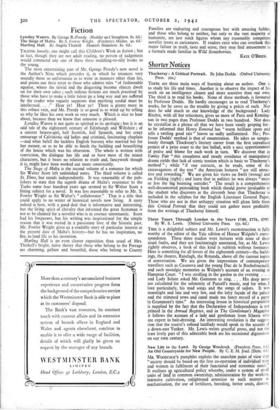Shorter Notices
Thackeray : A Critical Portrait. By John Dodds. (Oxford University Press. 2os.)
THERE are three main ways of learning about an author. One is to study his life and times. Another is to observe the impact of his
work on an intelligence clearer and more sensitive than our own.
The third is to read his books. None of these methods is favoured by Professor Dodds. He hardly encourages us to read Thackeray's
works, for he saves us the trouble by giving a précis of each. Nor does he add much to our knowledge of the background: Lady Ritchie, with all her reticences, gives us more of Paris and Kensing- ton in two pages than Professor Dodds in two hundred. Nor does he crystallise in a phrase all that we have been vainly groping for: to be informed that Henry Esmond has " warm brilliant spots and tells a rattling good tale ' leaves us sadly unillumined. No ; Pro- fessor Dodds' method is that of enumeration. He takes us scrupu- lously through Thackeray's literary career from the first unrealised project of a prize essay to the last ballad, with a nice apportionment of praise and blame for each work in turn. We discover that in Vanity Fair " this casualness and steady avoidance of manipulated drama yields that lack of scenic tension which is basic to Thackeray's method " ; while " if one corrects, as he reads, some of the extravagances of the text " the American lectures " are still attrac- tive and rewarding." We are given his views on Swift (wrong) and on Fielding (right) ; and learn that in politics he was always " more or less the big beaming outsider." The result is a comprehensive well-documented painstaking book which should prove invaluable to the student who discovers at the eleventh hour that Thackeray is included in the syllabus for the English Literature General Paper, Those who are not in that unhappy situation will glean little from this Critical Portrait that they could not gather more profitably from the writings of Thackeray himself.


























 Previous page
Previous page